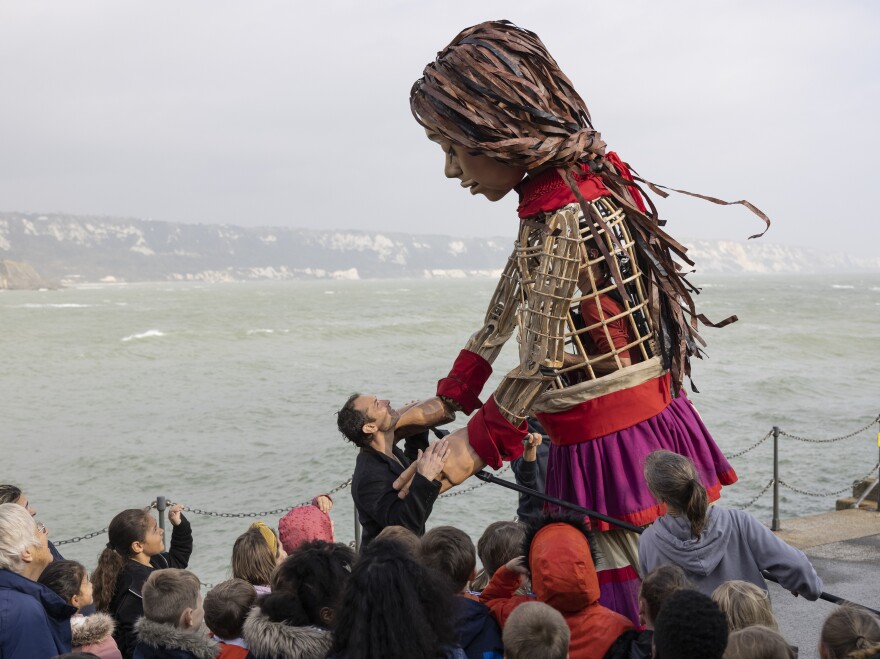"Little Amal," a 9-year-old Syrian refugee girl, has big, expressive eyes and loves jumping in puddles as she travels on foot to the UK in search of a new home.
But Amal isn't just any girl — she's a giant puppet more than 11 ft. tall. She's the centerpiece of The Walk, a traveling arts festival. It's the latest project by London-based theater company Good Chance, in collaboration with Handspring Puppet Company.
Amir Nizar Zuabi, the artistic director of the project, calls it a "pilgrimage slash theater show."
For the past three months, Amal and the crew have travelled from the Syrian-Turkish border to the UK in an effort to bring hope to the plight of refugees. Today, they reached Manchester, England, completing a 5,000-mile journey through more than 65 cities, towns and villages.
Making Amal
At various points during the journey, a team of theater practitioners walked with Amal in a coordinated effort to bring her to life — with a stilt-walker controlling Amal's head and eye movements, two arm puppeteers navigating her hand gestures, and several other puppeteers directing her from the outside.
"At the end of the day, it's an inanimate object which is furniture," Zuabi says. "And that never ceases to amaze me because in the assembly, there is a moment where she stands up and we check that everything's in place. And there's always a moment where she takes a breath, or our puppeteers together take a breath. And a second after they took that breath — she's alive. She's no longer a very sophisticated armchair or piece of furniture. Suddenly, she's a living creature with thoughts, with complexities, with wants, with fears."
Zuabi intimately understands the refugee experience. Born in East Jerusalem, he came from a mixed family — his father is a Muslim-Palestinian and his mother's family is Jewish-European; they fled Europe during WWII. "And obviously, their safe haven became a tragedy for the other side of my family. So it's complicated," Zuabi says.
Developing a love of theater
When he was 14, he stumbled upon a school courtyard where a rehearsal by El-Hakawati Theatre (today the Palestinian National Theatre) was taking place. That was the day he fell in love with theater, he says. Zuabi would later go on to run that same theater company.
"There was something about the fact that you can create a different reality — a moment of beauty. Something that is beyond the rules of where you're living [and] that doesn't adhere to gravity. That made me fall in love [with theater]," he says.

After the height of the Syrian refugee crisis in 2015, Good Chance worked on a series of successful projects concentrating on the refugee experience with artists from refugee backgrounds. In 2019, Zuabi started to collaborate with them — it became clear that the theater itself needed to be in the streets, the same ones that the refugees were traversing themselves.
So after almost three years of planning, The Walk was born. Through accompanying events along the route, like installations and performances, it was important that the walk recognize the range of Amal's experiences — not just one of hardship, but resilience too, Zuabi says.
"I don't want anybody to feel sad for refugees. I want people to see themselves when they see a refugee. And that's why puppets are gorgeous. Because a puppet doesn't exist until you give it life. And it was important for me also that you see the mechanics — you see the puppeteer inside her. She's completely fake. You need to assert yourself. You need to go 'she is a refugee' and the minute you treat a refugee like this, you go 'he is me. They are us.'"
From visibility to empathy
Even Amal's size at 11 ft. — or 3.5 meters — is deliberate. To Zuabi, visibility is the first step towards empathy. He says "to see that people are moved by a small gesture she does in the middle of a street, and suddenly you look around and people are wiping their tears — that's very, very beautiful to see," Zuabi says.
In Arabic, Amal means hope. Through art, Zuabi hopes that perhaps the world will see the refugee story as one of shared humanity; that, ultimately, although people's life experiences are different, stories are the same.
"I hope that for a small child in Torino [Italy], she will be an inspiration to think big and dream even bigger. I hope for our puppet Amal that she goes and gets a Ph.D. in mechanical engineering. But maybe the word I'm using most right now is I hope and I hope and I hope. I hope she gives hope to many people."
This piece has been adapted for digital from Amir Nizar Zuabi's full interview with Manoush Zomorodi for TED Radio Hour. The audio version was produced by Katie Monteleone.
Copyright 2021 NPR. To see more, visit https://www.npr.org.




